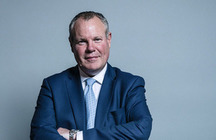Conor Burns – 2021 Speech on Global Britain
The speech made by Conor Burns, the Conservative MP for Bournemouth West, in the House of Commons on 11 January 2021.
To anyone in this House or beyond this House who thinks that global Britain is somehow an aspiration, not a reality, I would commend to them the excellent report by Robin Niblett of Chatham House entitled “Global Britain, Global Broker” where he points out that the United Kingdom already has a seat at all the key multinational organisations—the IMF, the G7 and the G20—and is a permanent veto-owning member of the UN Security Council, and that is before we even look at the Commonwealth or NATO. We are fourth-equal place with Germany and Japan in the number of full-time embassies and high commissions, and sixth in terms of defence spending.
I think we have an obligation to define what global Britain means. I would say, before I incur the wrath of my friends on the Northern Ireland Benches and the noble Baroness Hoey, that global Britain also includes Northern Ireland—it is the United Kingdom of Great Britain and Northern Ireland. Of course, it goes to much more than trade—it is also about foreign policy, security, intelligence, development and defence, which are all part of the complex infrastructure that represents the UK overseas. The challenge is for us to distil that into a coherent offer that the world will understand.
I have not spoken on the subject of trade since I left the Treasury Bench. I could say that I resigned or I could say that I did a job swap with my right hon. Friend the Minister for Trade Policy. As I went around the world as Minister of State for trade, I was struck by the interest there was in the United Kingdom and what Brexit meant in terms of our ability to re-engage. People were interested in green technology, fintech, the City of London, financial services regulation, and what the UK could do in terms of infrastructure. When I was in Vietnam, Morocco, Algeria, Brazil, Chile and even the United States, there was huge interest. One could almost say that if global Britain were a Tinder profile, we would crash with the numbers seeking to swipe right. I beg the indulgence of the House briefly to place on record my thanks to those who worked with me at the Department for International Trade in my private office: my senior private secretary, Marcus; and St John, Alessandro and Emily. They were a delight to work with; I am not sure they would always say the same about me.
We have talked about values; trade delivers prosperity, jobs and the emergence of a middle class in poorer countries, and it is the emergence of a middle class that leads to the demand and drive for rights such as female emancipation, the education of girls, LGBT rights, freedom of speech and the rule of law—as distinct, of course, from rule by lawyers. We saw the same thing ourselves in the industrial revolution. As we look at doing joint economic and trade committees, trade agreements and all the rest, we should never forget that, fundamentally, this is about prosperity and dignity for individuals around the world. That aspect of what we call global Britain is not just economic or even political but is, in the most real of senses, a moral mission.

